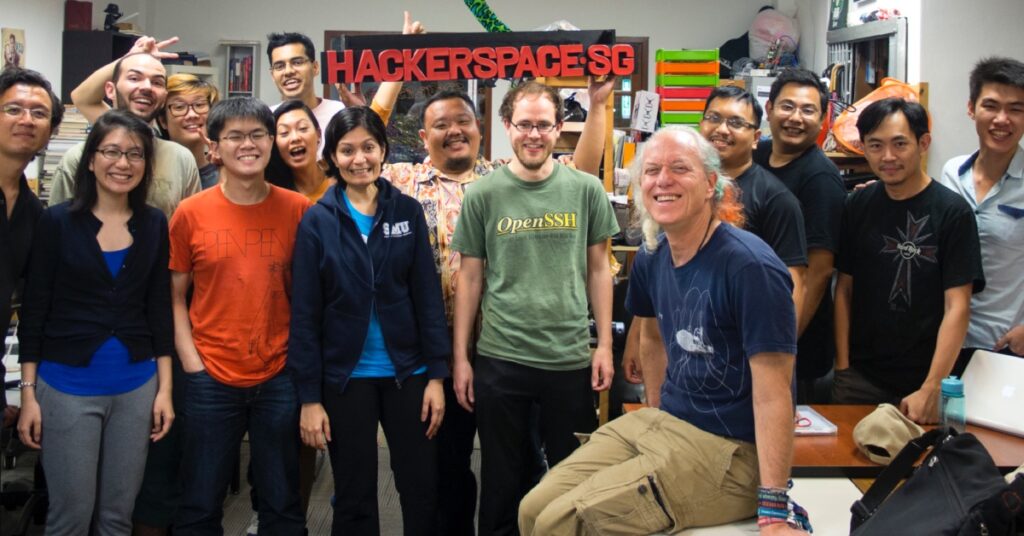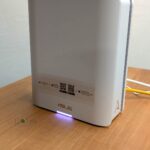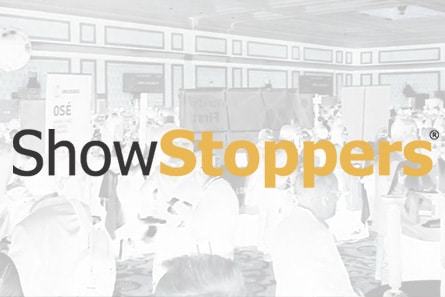
The 2010s marked a revival for Singapore’s tech scene.
After the dotcom bust had wiped out many tech startups, a new generation of founders began to emerge—ready to experiment, build from scratch, and take risks on their own ideas.
Amid this resurgence, a new kind of community began to take shape. Across Singapore, maker spaces, co-working hubs, and startup incubators started sprouting, many of them backed by big tech eager to nurture local developer ecosystems.
But the pioneer of it all was a small, scrappy space on Bussorah Street called HackerspaceSG.
Founded in 2009 by four friends who wanted a home for Singapore’s geeks, engineers, and entrepreneurs, it became the beating heart of the city’s early startup culture—a place where ideas were soldered together over coffee, curiosity, and community.
The space saw itself as the “larval stage of a start-up,” said Wong Meng Weng, one of the co-founders of HackerspaceSG, back in 2013. “Tech developers come here, meet others, hook up, quit their jobs, and start their own projects at Hackerspace.”
And indeed, many did. Within its walls, ideas and collaborations were born that would go on to shape Singapore’s early tech ecosystem.
HackerspaceSG helped spawn initiatives like JFDI.Asia, the region’s first startup accelerator, to mentor and fund budding entrepreneurs. Alumni like Ruiwen Chua would go on to found startups such as mobile learning software Square Crumbs and property listing platform 99.co, while other members launched global successes like streaming service Viki.
But as Singapore’s startup scene took off, HackerspaceSG slowly receded into the background. Today, it is a name that has largely faded from today’s conversations about the entrepreneurial ecosystem.
How did a once-vibrant community hub slip quietly into the background of the very scene it helped create?
The “Zouk of Geekdom”

Back then, how HackerspaceSG worked was simple: it gave members 24/7 access to a space to tinker with software, hardware, and electronics—a haven for anyone with curiosity and a soldering iron.
The space operated on a community-driven model. Decisions were made collectively, activities were maintained by volunteers, and the vibe was more clubhouse than office. Members shared equipment, traded expertise, and learned by doing—a self-sustaining ecosystem of experimentation, or as they liked to call it, “the Zouk of geekdom.”
Membership fees back in 2011 ranged from S$32 to S$512, depending on frequency of usage, from casual access to full-time, seven-day-a-week availability. It essentially functioned like a co-working space.
Despite the seemingly steep prices, people kept coming. It was, after all, the height of Singapore’s DIY movement—a time when access to affordable technology and online tutorials made it easier than ever to build things from scratch. A growing number of local enthusiasts were putting their hands and minds together to make robots, phone chargers, 3D printers, and even write their own software applications, so HackerspaceSG naturally became a focal point.
Just two years after its founding in late 2009, the space had grown from 24 members to more than 60, supported by a 300-strong mailing list buzzing with activity.

And with that momentum came the lifeblood of the community: weekly meetups and workshops.
The space regularly hosted technical sessions, hardware demonstrations, hackathons, and social nights, even attracting prominent figures. During the height of Singapore’s tech startup boom, Facebook co-founder Eduardo Saverin dropped by to meet the city’s growing tribe of builders and entrepreneurs.
Back then, tech giants played a pivotal role in fuelling the scene. In the 2010s, companies like Microsoft, Google, AWS, and PayPal frequently sponsored local developer events and hackathons, helping developer communities thrive. PayPal’s BattleHack came to Singapore in 2014, while AWS and Google Developer Groups ran regular meetups that provided venues and mentorship.
Eventually, Singapore’s startup and tech scene grew exponentially over the years. Now backed by government grants and VC funding, startups slowly moved away from soldering benches to shiny new co-working spaces.
The ecosystem that HackerspaceSG helped ignite was thriving—but in that success, the need for a place like it quietly diminished.
Fading but far from dead
Once pulsing with late-night energy and raw experimentation, HackerspaceSG began to quiet down in the late 2010s.
The chatter of keyboards and the clatter of tools slowly gave way to silence as members found new homes in startups, labs, and companies that had grown out of the very movement it started.
Even for those who didn’t take the entrepreneurial route, many went on to grow from strength to strength in their careers—carrying with them the spirit of experimentation and community that defined the space.
These alumni have paid it forward, building networks and mentorship groups like Engineers.SG, Junior Dev SG, and KopiJS to keep the maker spirit alive.
The founding members who once camped out in its shophouse, soldering prototypes and brainstorming startups, have also long moved on today—though they still drop by occasionally, as if visiting an old friend.
The pandemic played a part in quieting things down. A member of HackerspaceSG shared that tech giants have “somewhat begun” to wind down their venue sponsorships and support for developer community events since COVID-19, a stark contrast to backing that once fuelled the 2010s tech boom.

In a way, HackerspaceSG had succeeded almost too well. The community it helped spark had outgrown it.
But don’t get it wrong—while things have quietened down, HackerspaceSG is far from dead. The space still endures, smaller, quieter, and perhaps less visible than in its heyday, but no less meaningful to those who still gather there. It remains open 24/7 to members.
Over the years, HackerspaceSG has shifted homes several times—starting from its humble beginnings on Bussorah Street to its bustling heyday at King George’s Avenue. In 2021, facing rising rents, it moved to a smaller unit within the same building, and eventually relocated once again to Textile Centre in Dec 2024.
Due to space constraints, HackerspaceSG can no longer host as many meetups as before. Yet, new initiatives, tinkering sessions, and workshops continue to surface, adapting to smaller spaces and tighter budgets. This year, the space has seen programming workshops, AI-focused sessions, and Junior Dev meetups, among other initiatives.
Sparking a movement bigger than itself
Today, members describe HackerspaceSG as more than just a space for software enthusiasts—it’s evolved into a launchpad and community hub for tinkerers and builders of every kind.
Be they seeking to break new ground in 3D printing, laser cutting, cobbling together ideas for a new software startup, or even designing circuits for experimental electronic products, they will always have a place at HackerspaceSG.
“Back in 2009, the founders of HackerspaceSG shared a common vision: a safe space for like-minded geeks to gather, and for technical creativity to bloom,” said Meng Weng, reflecting on the community’s journey.
At a time when the community was still very nascent, it provided a space and an identity, helping Singaporeans spur ideas of what was possible in their island.
Fifteen years on, HackerspaceSG may no longer sit at the centre of Singapore’s tech scene, but it will always be where Singapore’s maker spirit first found its spark—a small, scrappy space that sparked a movement far bigger than itself.
- Read other articles we’ve written on Singaporean startups here.
Also Read: HP launches programme to accelerate startup growth & AI breakthroughs in Singapore
Featured Image Credit: HackerspaceSG
Last modified: October 28, 2025







